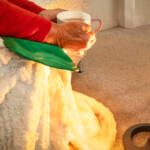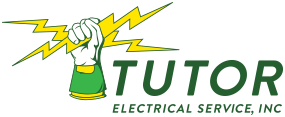Winter Electrical Safety 101 for North Texas Homes and Businesses

As temperatures drop in North Texas, we depend more on heating tools like electric blankets and space heaters.
But with winter comes a spike in electrical hazards, fires, and costly damage. Every year, heating equipment causes more than 65,000 fires in the U.S. These fires lead to great loss of property and even lives.
There are many ways to stay safe this winter. It is important to understand electrical safety and take the right steps.
Let’s help you stay warm, safe, and worry-free this winter!
5 Common Winter Electrical Safety Hazards
Winter presents unique electrical challenges for homes and businesses in North Texas:
- Overloaded Circuits: When heaters, lights, and appliances run simultaneously, circuits can easily overload, increasing the risk of fires.
- Faulty Heating Equipment: Space heaters and electric blankets are handy. However, they can be dangerous if old, damaged, or used incorrectly.
- Improper Use of Extension Cords: Overloaded extension cords can cause fires, especially when used with heating devices.
- Damaged Electrical Systems: Cold weather and moisture can harm wires, outlets, and connections, causing short circuits or electrical failures.
- Power Outages and Surges: Winter storms can lead to sudden power outages. When power comes back, it can cause surges, damaging your devices or electrical systems.
5 Winter Electrical Safety Tips
Follow these electrical safety tips to protect your home or business in North Texas this winter:
Inspect Heating Equipment Before Use
- Check space heaters, electric blankets, and portable heaters for frayed wires or damaged plugs before turning them on.
- Keep heating equipment 3 feet away from flammable materials like curtains, bedding, or furniture.
- Ensure your heater has an automatic shut-off feature that turns it off if it overheats or tips over.
Avoid Overloading Circuits
- Limit how many devices you plug into one outlet. Overloaded circuits can overheat and start a fire.
- Always plug space heaters directly into a wall outlet—never use an extension cord or power strip.
Practice Extension Cord Safety
- Use extension cords rated for heavy loads when necessary, but don’t overload them.
- Never run extension cords under rugs or carpets, which can cause overheating.
- Replace damaged or cracked cords immediately.
Schedule Home Electrical Maintenance
- Hire a professional electrician to inspect your home or business’s electrical system annually.
- An inspection can catch problems like damaged wiring, outdated systems, or overloaded panels before they cause fires.
Prepare for Power Outages
- Keep flashlights, batteries, and emergency supplies on hand. Avoid using candles, as they can start fires.
- Use surge protectors to prevent damage to electronics when power returns after an outage.
How to Prevent Electrical Fires This Winter
Use Space Heaters Responsibly
- Turn them off when leaving a room or before going to sleep. Leaving them unattended increases the risk of overheating or sparking a fire.
- Invest in heaters with automatic shut-off features that turn the unit off if it tips over or overheats.
- Keep a 3-foot space around space heaters. Ensure they are not near flammable items like curtains, blankets, or furniture.
Keep Electrical Cords in Good Condition
- Inspect cords regularly for cracks, frays, or exposed wires. Replace them immediately if damaged.
- Avoid running cords under rugs or carpets. This can cause overheating and prevent you from noticing damage.
- Use cords that match the power needs of the appliance or heater to avoid overloading.
Don’t Overload Outlets
- Spread out your electrical load across different circuits to avoid overheating.
- Use dedicated outlets for high-power devices like space heaters. Never plug these devices into extension cords or power strips because they do not support heavy loads.
- Unplug devices when not in use to reduce the risk of short circuits and save energy.
Check Smoke Alarms Regularly
- Test smoke alarms monthly to ensure they’re working properly. Replace the batteries twice a year or whenever you hear a low-battery chirp.
- Place smoke alarms in every bedroom, outside sleeping areas, and on every level of your home or building.
- Consider installing smart smoke detectors that can send alerts to your phone, providing peace of mind when you’re away.
Upgrade Your Electrical System if It’s Outdated
Older homes and commercial buildings might have old wiring. This wiring can fail with the higher demands of modern appliances and heating systems.
Signs of an outdated system include:
- Frequent breaker trips or blown fuses
- Outlets that spark are warm to the touch or emit a burning smell
- Flickering lights when running appliances or heaters
Hire a licensed electrician to check your system. They can suggest upgrades like modern panels, new wiring, or extra outlets.
When to Call a Professional Electrician
Resolving electrical issues carries safety risks and requires specialized training – we don’t recommend DIY fixes here. Call a licensed electrician if you notice any of the following:
- Frequent circuit breaker trips
- Flickering lights when appliances or heaters are on
- Burning smells or scorched outlets
- Outlets that feel warm to the touch
- Sparks or unusual noises from electrical panels or devices
Winter can be challenging, but with proper precautions, you can stay warm and safe without risking your property. This season, implement our electrical safety tips to prevent electrical fires, overloaded circuits, and costly damage.
Need help ensuring your home or facility is winter-ready? Contact Tutor Electrical Service, Inc. today for a safety inspection or electrical service.
Tutor Electrical Service, Inc. specializes in commercial electrical design-build services and residential electrical safety inspections. Stay safe and stay warm this winter, and let Tutor Electrical Service, Inc. take care of your electrical needs.


